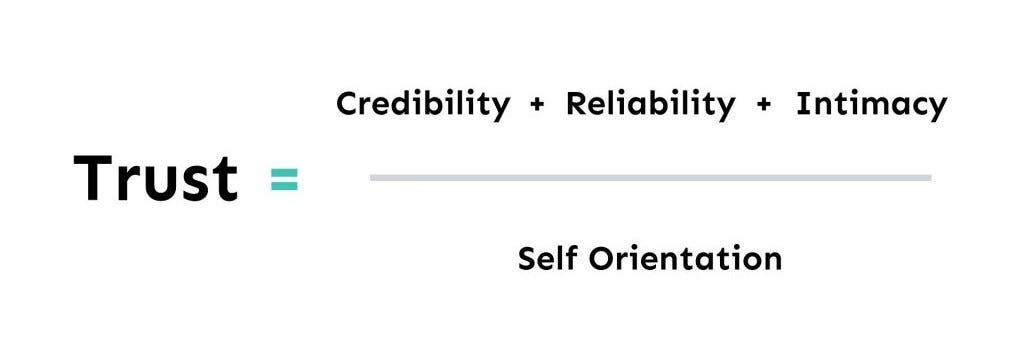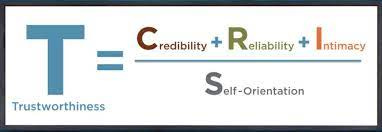Mastering the Trust Equation for Strong Relationships
High trust teams are high performing teams. Get intentional about developing trust from day 1.
👋 Hey, Kyle here! Welcome to The Influential Project Manager, a weekly newsletter covering the essentials of successful project leadership.
Today’s Overview:
Trust is the real currency is business. Teams will never reach high levels of performance if there's no underlying trust.
The problem with trust is that most think it's either there, or it's not. Turns out, this is not true. You can develop trust just like you can develop a skill. If you do it in an authentic and intentional way, you encourage others to do the same.
How trustworthy are you? The equation for trust equals the sum of your (Credibility + Reliability + Intimacy) divided by your Self-orientation.
The Trust Equation: How You Build Trust in Teams
Filed under: Leadership & Managing People, Frameworks & Tools
In today's issue, we're zeroing in on trust.
I'm a big believer in trust as the real currency of business.
Teams will never reach high levels of performance if there's no underlying trust.
The problem with trust is that most think it's either there, or it's not. Turns out, this is not true.
You can develop trust just like you can develop any skill. If you do it in an authentic and intentional way, you encourage others to do the same.
Let's break it down:
What is The Trust Equation?
Trust can be built in an authentic way. This is explained by the trust equation, developed by David Maister.
In the equation, you are perceived as trustworthy if the sum of your (credibility + reliability + intimacy) outweighs your self-orientation.
By quantifying trust, the equation makes evaluating it more accessible as well as improving more practical.
In particular, the idea of trust as being hurt by the level of one’s own self-orientation, and the formulation of that in equation format, is thought-provoking. I love it because it makes something intangible very concrete.
Let's break down the elements one by one, so you can start building trust. Not only to be trusted yourself, but also to model the behavior you'd like to see in your teams.
Credibility
“What you say and how believable you are to others.”
Credibility has to do with the words we speak. In a sentence we might say, “I can trust what she says about change management; she’s very credible on the subject.”
Do you have the skills and knowledge to be considered an expert in your field? If not, no problem - as long as you don't try to fake it. What can you bring to the conversation to show that you know what you're talking about?
You can raise your credibility with:
Proven outcomes
Recommendations or testimonials
Qualifications or accolades
Solid experience and a track record in your domain
Reliability
“Actions, and how dependable you appear.”
Your reliability has to do with actions. We might say, “If he says he’ll deliver the task tomorrow, I trust him, because he’s dependable.”
You're judged on what you do, not what you say. Give people the feeling that they can count on you. Do as you promise, and keep their information safe.
To demonstrate reliability:
Be on time
Communicate with clarity
Honor your commitments
Align with team norms and values
Intimacy
“How safe people are sharing with you.”
Intimacy refers to the safety or security that we feel when entrusting someone with something. We might say, “I can trust her with that information; she’s never violated my confidentiality before, and she would never embarrass me.”
The closer people feel to you, the deeper the relationship can develop and the stronger the bond gets. Appropriate intimacy is what takes a relationship beyond transactional. It's what makes you human.
To raise intimacy:
Create a safe space for sharing
Find shared interests or experiences
Be genuine and purposeful in your interactions
Open up about (appropriate) personal matters
Never forget: humans connect with humans. Drop the facade.
Self-orientation
The fourth characteristic, self-orientation, is all about where your focus lies—on your own ambitions and needs, or on those of others. It's the measure of whether someone is self-centered or genuinely others-oriented.
We might say, “I can’t trust him on this deal — I don’t think he cares enough about me, he’s focused on what he gets out of it.” Or more commonly, “I don’t trust him — I think he’s too concerned about how he’s appearing, so he’s not really paying attention.”
Everyone has this, but the amount matters. For some, this develops into putting themselves first - ahead of others or the team.
Clearly, an excessive focus on oneself is counterproductive in a collaborative environment.
Lower your (perceived) self-interest through:
Demonstrating authentic interest in the people around you.
Aligning your goals with those of your team or partners.
Shifting the focus away from yourself—celebrate others' achievements and contributions.
Offering support freely, yet be willing to seek assistance rather than always giving advice.
The Trust Equation in Action
Assessing your own trustworthiness is subjective. Done in the proper spirit of self-improvement, it can be an illuminating experience.
The top parts of the equation add up. What this means in practice, is that you can make up for lower reliability with high intimacy and credibility.
A personal example: a project manager I collaborated with was notorious for missing deadlines. But his exceptional problem-solving skills during critical project phases and his willingness to go the extra mile for the team meant his reliability shortfall was overshadowed by his undeniable credibility and intimacy.
Self-orientation sits at the bottom of the equation, acting as a non-negotiable factor. A high self-orientation erodes trust; it's immediately noticeable and triggers alarms.
Back to my previous example: if the project manager had prioritized his own agenda or success over the project's or team's needs, no level of reliability, credibility, or intimacy could salvage the trust lost.
Final Takeaways
The Trust Equation covers the most common meanings of trust that you encounter in everyday business interactions.
Trust is the real currency in business, and it forms the base of team performance. If there's no trust, forget about all the tools & tactics - address trust first.
The next time you find yourself in a conflict, ask yourself: do we really trust each other?
Think about the strength of the underlying relationship. Is everyone perceiving each other as credible, reliable, and is there enough intimacy? Or is it ruined because someone is being selfish? Find what element is missing, and experiment with building it up.
Your role as a leader is to model the right behavior, and give feedback where you see room for development. Slowly but surely, you'll build a rock-solid team, and performance will skyrocket.
Final tip: if this is an issue in an existing team, have an open conversation about it. It's a risky play, but you'll see quickly who is committed and who is not. Be vulnerable, lead by example, talk through this framework and give yourself feedback in public. Be prepared to mediate and have some 1:1 conversations afterward.
Until next week,
Kyle Nitchen

When you're ready, here’s how I can help:
Upgrade your PM software. Project financials, management, and construction admin. Switch to INGENIOUS.BUILD to evolve from an administrative project manager to strategic project leader.
Get my full toolbox (free). It contains 30+ software and hardware tools I’m using today.
Hold your schedule accountable. Gain stability and flow in your projects with this Takt Planning & Control online course. Use code “Influentialpmtakt” for 30% off!
Advertise in this newsletter. Put your brand in front of 2,500+ construction project managers, leaders, and execs. (Booked out 5 weeks)
Support this Newsletter. The Influential Project Manager articles will remain free, but if you find this work valuable, I encourage you to become a paid subscriber. As a paid subscriber, you’ll help support this work.





